 |
|||
|
|
|||
| Who Is Evelyn Underhill (1875-1941)? | |||
|
|
|||
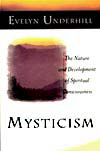 |
||
 Mysticism : The Nature and Development of Spiritual Consciousness Mysticism : The Nature and Development of Spiritual Consciousness by Evelyn Underhill |
||
| Illumination, Self Realization, God realization: What are these experiences? | ||
|
Mysticism, first published in 1911, was at once hailed as a classic and
swiftly established its author as the foremost authority on the subject in the
English-speaking world. Here she offers an excellent introduction to
mysticism, discussing the works of such great mystics as Meister Eckhart,
St. John of the Cross, St. Teresa of Avila, Rumi and 'Attar. Mysticism
draws on hundreds of sources from all over the world and remains the
pre-eminent study of human spiritual consciousness.
(Also See the Online Version of Mysticism at www.Gnostic.Org) |
||
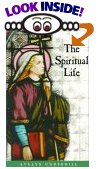 |
||
| The Spiritual Life by Evelyn Underhill |
||
|
An uplifting description of the pursuit of the spiritual life, written by one of the greatest mystics of the 20th century, who describes notr only the spiritual state of communing with God but also the state of cooperating with God! |
||
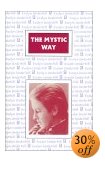 |
||
| The Mystic Way by Evelyn Underhill |
||
|
... Reviews the development of the mystical tradition within Christianity and defines the true character and origin of the Christian mystic. The author also examines how Christian mystics differ from mystics of other spiritual traditions--and how Christian teachings enrich the mystical experience. |
||
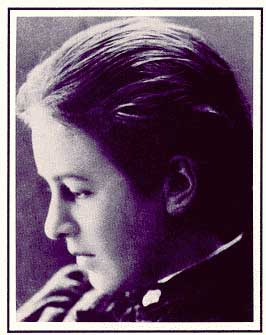 The following is quoted from the "The Essentials of Mysticism and Other Essays". The following is quoted from the "The Essentials of Mysticism and Other Essays". And a little more: Quoted From "Daily Readings with a Modern Mystic: Selections from the Writings of Evelyn Underhill," Delroy Oberg, editor. It often happens that well-known writers suffer a period of eclipse after their death. This has certainly been the case with Evelyn Underhill. During her lifetime, and in particular from the publication of her major work Mysticism in 1911until her death in 1941, Evelyn Underhill was one of the best-known spiritual writers in Great Britain. However, after her death her reputation declined. In the 1950s and 1960s she was criticized for making the spiritual life too comfortable and private, and for not being sufficiently in touch with the social and political realities of her time. How far these criticisms were justified, readers of this selection from her works will be able to judge for themselves. Such criticisms seem to me to be for the most part superficial and misdirected. What is beyond question is that in the last ten years and more interest in Evelyn Underhill's life and work has been growing rapidly, first in the United States and more recently in Britain. It is not too difficult to see why this should be. Evelyn Underhill was a pioneer in the twentieth-century study of mysticism and spirituality. She was a prolific writer who produced many books, some large and academic, others small and easily accessible, but all centered on this one theme. Now, for whatever reason, the last twenty years have seen a growing interest in mystical and spiritual questions throughout the English-speaking world and it has been natural for people to turn back to one of the outstanding exponents of these questions from the earlier part of the century. Evelyn Underhill was also a pioneer in that she was a woman exploring these fields of studies. She was working at a time when it was very unusual for a woman to become an authority on theological matters, to lecture at the University of Oxford, to speak in Canterbury Cathedral, to become well known as a retreat conductor and spiritual director. These accomplishments that would be normal today were not at all normal in the years between the two World Wars. But into all these areas Evelyn Underhill made her way. Quietly and without fuss, she became the first woman to break into realms that for centuries had been exclusively male preserves. She did not indulge in polemic and controversy; she simply went ahead and opened the doors. Born in 1875, the daughter of a London barrister, and married in 1907 to a childhood friend who was also a lawyer, Evelyn Underhill's life was outwardly uneventful. She and her husband were in many ways typical upper middle class people of their time. Inwardly, however, beneath the carefully "ordinary" exterior of her life, Evelyn was thing but ordinary. She was a woman of great intelligence, of remarkable energy, and of passionate commitments. For her, as for many of her contemporaries, it was not easy to live a deeply religious life in a world that either ignored religion altogether, or at least took its claims lightly. Her interest in the great mystical writers of the past was far from being simply academic; it was because she longed to live with the same immediacy of contact with the Divine that she gave so much time to studying and expounding their writings. She longed to make the teachings of the past come alive for her contemporaries and she succeeded in doing this to a remarkable degree. One of the most remarkable qualities of her work, taken as a whole, is the variety of styles it encompasses, from scholarly editions of medieval writers, through essays for theological periodicals, to retreat addresses and meditations intended for lay people of all backgrounds. In her writing she constantly seeks to combine the analytical with the experiential, the academic with the imaginative in a way not at all common among theologians; this perhaps reflects a specifically feminine concern for the wholeness of human life and experience. |
||
 The Essentials of Mysticism and Other Essays (Mysticism) by Evelyn Underhill 1920. These nine essays deal with various aspects of the general subject of mysticism. Some discuss its general theory and practice and others deal with its application as seen in the lives and works of the mystics, from the pagan Plotinus to the Christian contemplatives of our own day. Contents: essentials of mysticism; the mystic and the corporate life; mysticism and the doctrine of atonement; the mystic as creative artist; education of the spirit; place of will, intellect, and feeling in prayer; mysticism of Plotinus; three medieval mystics; mysticism in modern France. |
||
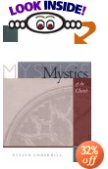 The Mystics of the Church by Evelyn Underhill This little book only hints at the richness and variety of the material with which anyone who tries to tell the spiritual history of the Christian Church will have to muddle through. The author has selected a few of those mystical saints whose greatness is most closely connected with their dependence on and contribution to the family life of the household of faith. |
||
 The Ways of the Spirit by Evelyn Underhill, Grace Adolphsen Brame While searching through the archives of poet and author Evelyn Underhill, Grace Brame discovered four important handwritten retreats given by Underhill that were thought to be lost. In these writings, Underhill takes up some of the timeless themes of spiritual life: the call of God, sanctity, inner grace, and our purpose in life. |
||
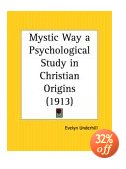 The Mystic Way a Psychological Study in Christian Origins (1913) by Evelyn Underhill Herein the author traces the type of life that is mystical. Mysticism and Human Life; Mysticism and Christology; St. Paul and the Mystic Way; The Johannine Mystic; The Mystic Life in the Early Church; The Witness and the Liturgy; The Outer Mystery and the Inner Mystery. |
||
|
|
||
| Page List | Home Page & Search For
|
||